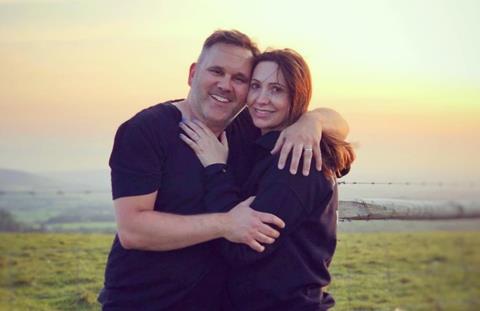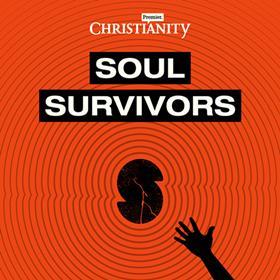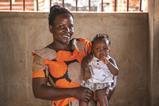Matt and Beth Redman’s new film Let There Be Light explores the emotional abuse the couple experienced at the hands of Soul Survivor’s Mike Pilavachi. They spoke to Megan Cornwell about why they made it, and what they hope will change in the Church

After all these years of carrying this, how does it finally feel to have your voices heard?
Matt Redman (MR): We’ve put out a couple of little statements in the past, but it’s been nice to speak in more detail. Really, the hope is that we’ll help a lot of victims. Every time we’ve said anything, there’s a wave of people coming forward. Hopefully this will unlock some more freedom for people - and help the Church think about some of these safeguarding structures.
Beth Redman (BR): When you can’t stay, but you can’t say, you can look flaky, or like you’re against something, but the truth is so different. We would have loved to have stayed in Soul Survivor and been part of that wonderful ministry, shaping the lives of young people.
It’s a relief to be able to tell the truth, but it still feels very sad. It feels, in many ways, we’re still doing it in isolation. The silence from a lot of leaders, even today, is part of the problem. Why can’t we just say: “It is wrong that somebody abused their platform and privilege, and we stand with survivors.” I don’t know what is so hard about that.
Do you have a sense of what is stopping leaders from speaking out?
MR: When this story first broke, I can understand why there was disbelief. Now, you’ve had the investigation - nearly 150 people were spoken to - and all of these claims of coercive control, emotional, psychological, spiritual, physical abuse have been substantiated.
At that point, it becomes harder to understand why there’s such a culture of silence. There can be a fear of say[ing] things in the social media domain, but it’s so important, because there’s people who need to be spoken up for.
All of this has come out, and Mike got a written warning. If he wants to reapply for ministry, he can. That’s staggering
BR: We have compassion for leaders who partnered with Mike and platformed him, because he was their friend. They’re also going through a process of grief, shock and disbelief. But the fact that there is still so much silence actually underlines how this was allowed to go on so long. We can’t demand anyone does anything, but it is a reflection of Church culture.
Matt, you talked about psychological, emotional and physical abuse. What impact has this had on you personally?
MR: I had quite a troubled upbringing. I lost my father when I was seven, and I’d been sexually abused. Mike was the person I told about that. I look back on those moments, and it is quite hard to revisit. There’s utter relief that I got to tell this youth leader what had happened to me, and he helped me go to the police. But now, as I look at some of the patterns…he would counsel me about that abuse. He’d want to know all the details, but then he would wrestle me afterwards. That felt uncomfortable. It’s very troubling. When I spoke to the investigation about that, they actually advised me to speak to the police.
One of the hardest things has been hearing other people’s stories. There’s people we knew and loved, that we didn’t know had gone through some of this. Some of them match up so much with my own experience. It was done in exactly the same way. It made me realise: Oh, I don’t think this was just accidental from Mike. Honestly, that’s really hard to think about.
What would you say to those who have been to Soul Survivor, who experienced God or even had prophetic words from Mike, and are now really confused about whether they did encounter God in that ministry?
MR: We may never get to the bottom of how God is doing all this amazing stuff and yet, at the heart of it, there’s this massive compromise of character in the person leading the whole thing. I struggle to understand it myself, honestly.
A lot of my journey is a lot of entanglement. In one sense, I was getting mentored but, at the same time, I’ve been told by several professionals that I was being groomed. I don’t understand how those two things can coexist, but I do understand that, somehow, in his beautiful grace, God plants stuff in the soil of our suffering. I would encourage anyone who’s struggling with that kind of tension to hold on to the good. Don’t throw it out. There’s been so much good through Soul Survivor.
I lost my father when I was seven, and I’d been sexually abused. Mike was the person I told about that
Mike had many opportunities to change. A lot of people spoke to him, spoke to others in authority over him and, sadly, they were all met with a brick wall. People speaking on social media and things like this documentary coming out, that’s a much harsher process than it needed to be. So many times he was confronted by people who loved him, but he chose to silence those people. That’s why we’re at where we’re at now.
BR: We did go to senior church officials and leaders. We tried to follow the process internally, but Jesus used people we never expected to bring this to light, like Dr Amy Orr-Ewing, online bloggers. That’s both sad and beautiful. People in authority turned away, but God used people we least expected to make a way for survivors to be heard.
In the documentary, you talk about how damaging emotional and psychological abuse can be, and how it often isn’t taken seriously. Is that why this story took so long to become public?
BR: I think it was because Mike was powerful. And he surrounded himself with a certain kind of person. There was not an accountability structure.
You speak about wishing you had left Soul Survivor earlier. Why do you think it was difficult to break those ties with Mike, even after you’d left?
MR: It feels very complicated. I was 13 years old. I told him this massive secret. He helped me walk through that and go to the authorities.
I had an undying loyalty to him, but it’s definitely deeper than that. You help build something together and God really seems to be in it and there’s so much fruit…it’s really hard to walk away from that.
Honestly, also you’re believing for the best. So many times we spoke to Mike about things and really hoped we could help him change. And we never gave up on that either. I wish I had walked away earlier than I did, but there was a lot of reasons why we didn’t.
BR: On reflection, other than confronting Mike, we didn’t really give him any boundaries. We allowed him to pick us up and drop us over and over again. My first interaction with Mike as an employee was a six month period of being utterly shunned. There was a lot of psychological bullying. But the minute he was OK with us again, we’d drop everything. We’ve had to take ownership of that, because I’m sure those factors made it hard for people to believe us when they first heard this, so we acknowledge that.
Sometimes people rush to support the structures of the Church, rather than the individuals within it
MR: There’s something about the nature of coercive control; you don’t realise how under the spell you are. So many people we spoke to say the same thing: “It was so hard to walk away. I don’t know why we didn’t do it sooner. I don’t know why we retained any connection with him.” That’s been a common thread. I don’t really understand it.
It must have taken you many years to navigate and process all of this. Do you feel like that your journey of healing is complete?
MR: It’s an ongoing process. I went a lot of years before counselling. It’s so easy to put everything through a discouraging lens, but actually, there are signs of the Church starting to make this more of a conversation, and get to grips with safeguarding. It’s really important not to lose sight of some really beautiful examples of leadership around as well.
BR: Our prayer was that the documentary doesn’t sound like: “Oh, Matt and Beth Redman are still stuck in 1997, they’re triggered and traumatised, they haven’t moved forward.” We’re free from so much of this but, when someone else bravely tells you their story, and you start walking with them, you begin to realise the scale of this. It isn’t just Matt and I speaking out. Not only did 150 people come forward, there are many who never spoke to the NST; who will never even tell their families; who won’t go to the police; who will not speak about this because they are still so traumatised and confused.
It’s those days that we feel a deep weight and a deep pain, but I think we have been able to separate what we went through and forgiving Mike. Jesus talks about that - 70 times seven – it’s an ongoing process. I feel I can say that we do release him, and we would love nothing more than for him to come to repentance and for God to do what only God can do, which is bring redemption.
What would you like to see happen next?
MR: I honestly don’t know. I have been really encouraged by the investigation - they did it quickly and they substantiated all these claims. But there does seem to be a distinct lack of an actual discipline measure. You can’t have all this substantiated, and then not really have some form of discipline at the end of it.
BR: It is shocking that Mike was able to resign. He wasn’t defrocked. He hasn’t received any measure of discipline. When Archbishop Justin Welby made an unprecedented statement in support of those coming forward when the investigation was only just starting, that meant more to us than I can explain. Then, subsequently, seeing this kind-of tumbleweed…All of this has come out, and he got a written warning. If he wants to reapply for ministry, he can. That’s staggering, when we know what we know.
Do you have any message for those leaders who have stayed silent on this?
BR: You can’t make demands. It’s not our right to expect that. I think it’s fair to say that silence is very painful when you are a survivor. But we can only pray that people who have positions of leadership will weigh their responsibility before God for their congregation, and respond accordingly.
What are the wider lessons for the Church?
MR: If someone comes forward, it doesn’t matter who they are. It’s important that people are heard and we validate people’s experiences. Sometimes people rush to support the structures of the Church, rather than the individuals within it. There are some brilliant resources out there that can really help congregations navigate that and become stronger and safer.
BR: It’s important that the people who speak out are not just supported and validated, but there is justice. Please can we create systems where leaders are accountable, where there’s follow through? That’s what is so important about the review by Fiona Scolding KC. Who should have acted? Who failed to act? Who knew about this? It is important those people are also held to account.

Hear this interview in full on the Soul Survivors podcast. The series also contains exclusive reporting and testimony from other survivors of abuse.
This article was edited by Emma Fowle






































2 Readers' comments